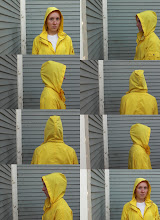In Nietzsche’s words “He who has a why to live for can bear with almost any how.”
According to Frankl, in order to satisfy the search for
meaning in life you change your attitude towards suffering. “…Everything can be taken away from a
man but one thing: the last of the human freedoms-to choose one’s attitude in
any given circumstances, to choose one’s own way.”(66) Even in the direst of
circumstances, such as experienced by Frankl in several concentration camps, he
notes of the opportunity to freedom and spiritual growth that is available. “It
is this spiritual freedom- which cannot be taken away-that makes life
meaningful and purposeful.”(67) Responsibility in your reactions creates
empowerment in the individual.
“The man that was not able to see his ‘provisional
existence’ was not able to aim at an ultimate goal in life” (70) “What man
actually needs is not tensionless state, but rather the striving and struggling
for a worthwhile goal-a freely chosen task.” (105) Working towards something in
the future provides hope for an individual, which helps them to find meaning in
life. The act of working is
meaningful and can be therapeutic for some.
The salvation of man is through love and in love. (37) Love
is another essential part of Viktor E. Frankl’s logotherapy, or meaning
therapy. “The second way of finding a meaning in life is by experiencing
something-such as goodness, truth and beauty-by experiencing nature and culture
or, last but not least, by experiencing another human being in his very
uniqueness-by loving him.” (111) Frankl speaks from experience on this front,
when in concentration camps, he would have “conversations” with is wife. It was irrelevant whether she was
present or not, but the anchoring feeling to love someone else can create
purpose for an individual.
Realizing the irreplaceable nature of man, others is a
concept mentioned in the book, I would extend the notion to the reality of
uniqueness and irreplaceable nature of not only others, but me. Realizing that, in loving myself and
realizing me is an essential part of creating meaning.
Misunderstanding is the root of all suffering; creating
understanding is to satisfy the search.
Life asks us a question at every moment and movement through these questions
and creation of questions is a process in living and meaning creation. Living brings meaning to life,
experience is part of living.
Edith Weisskopf-Joelson mentioned, “our current
mental-hygiene philosophy stresses the idea that people ought to be happy, that
unhappiness is a symptom of maladjustment. Such a value system might be responsible for the fact that
the burden of unavoidable unhappiness is increased by unhappiness about being
unhappy.” (114) Feeling a range of emotions is part of our experience in
life. “Emotion which is suffering
ceases to be suffering as soon as we form a clear and precise picture of it” (74)

No comments:
Post a Comment